It’s a query that dives deep into the heart of reptile nutrition and well-being.
In this article, we’ll unravel the mystery behind this essential mineral, exploring its pivotal role in the health of these magnificent creatures.
From understanding the signs of calcium deficiency to the potential dangers of over-supplementation, we’ve delved into every facet to provide you with a comprehensive guide.
By the end, you’ll not only grasp the importance of calcium for ball pythons but also be equipped with practical insights to ensure their optimal health.
Dive in and discover the fascinating interplay of diet, health, and care in the world of ball pythons.
Table of Contents
- 1 Do Ball Pythons Need Calcium?
- 2 Understanding Calcium’s Role in Reptiles
- 3 Symptoms of Calcium Deficiency in Ball Pythons
- 4 Sources of Calcium for Ball Pythons
- 5 The Danger of Excess Calcium
- 6 The UVB Connection: Synthesizing Vitamin D3
- 7 Feeding Practices for Optimal Calcium Intake
- 8 Wrapping It Up
- 9 FAQ
Do Ball Pythons Need Calcium?
Ball pythons, like all reptiles, require calcium for bone health and various metabolic processes. In the wild, they obtain sufficient calcium by consuming whole prey, primarily rodents. The bones in these prey animals provide the necessary calcium. In captivity, a diet of whole rodents, such as mice or rats, typically supplies adequate calcium. Therefore, additional calcium supplementation is generally not required for ball pythons fed a proper diet.
However, it’s essential to ensure they receive a balanced diet and monitor their health to prevent potential calcium deficiencies or other nutritional imbalances.

Understanding Calcium’s Role in Reptiles
When we think of calcium, we often picture a tall glass of milk or perhaps a piece of cheese. But for our slithering friends, the ball pythons, calcium plays a pivotal role that goes beyond strong teeth and bones.
Let’s dive deep into the world of reptiles and uncover the mysteries of calcium.
Why calcium is vital for reptiles
Reptiles, like humans, have a skeletal system. This system provides structure, support, and protection to their bodies. Now, imagine building a house with weak bricks. It wouldn’t stand tall for long, would it?
Similarly, for reptiles, calcium acts as the “strong brick” ensuring their skeletal system remains robust and durable.
In the wild, ball pythons munch on whole prey, primarily rodents. These rodents, with their tiny bones, are like nature’s calcium supplements. Every bite a ball python takes is infused with the goodness of calcium, ensuring they remain healthy and active.
The connection between calcium and bone health
Let’s take a moment to appreciate the architectural marvel that is the skeletal system. For ball pythons, their bones are not just about structure; they are about survival. A weak or brittle bone can be a death sentence in the wild.
Calcium ensures that their bones remain strong, allowing them to constrict their prey, move seamlessly, and protect themselves from potential threats.
Remember the last time you had a muscle cramp after a rigorous workout? That’s your body telling you it’s low on calcium.
Similarly, for ball pythons, a deficiency can lead to severe health issues, like Metabolic Bone Disease, where their bones become weak and deformed.
Calcium’s role in muscle function and nerve transmission
Beyond bones, calcium plays a starring role in muscle function and nerve transmission. Think of calcium as the backstage crew in a theater production. You might not see them, but without them, the show can’t go on.
For ball pythons, every time they move, constrict, or even breathe, calcium is at work, ensuring their muscles contract and relax properly.
Moreover, calcium acts as a messenger. In the complex network of nerves in a ball python’s body, calcium ensures that every message is transmitted seamlessly. From sensing danger to tracking prey, calcium ensures that every signal is loud and clear.
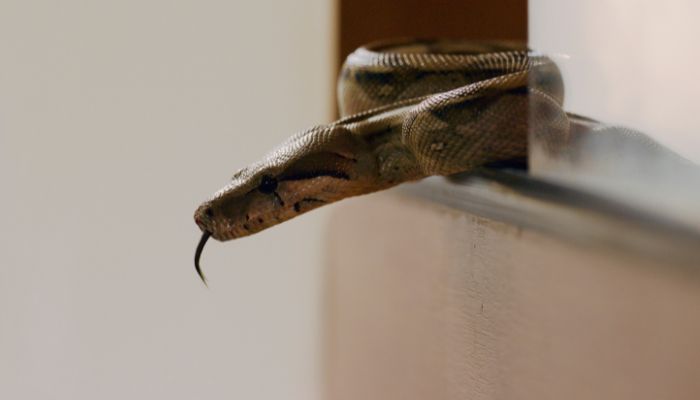
Symptoms of Calcium Deficiency in Ball Pythons
Just like humans, ball pythons can suffer from a lack of essential nutrients. Calcium deficiency, in particular, can lead to a host of health issues that can severely affect their quality of life.
Recognizing the symptoms early can make all the difference in ensuring the well-being of these fascinating creatures.
Physical signs: weak bones, kinks in the spine
One of the most apparent signs of calcium deficiency in ball pythons is weak or brittle bones. If you’ve ever held a ball python, you’d know they have a certain heft and strength to them.
A python with weak bones will feel noticeably different, almost fragile. Additionally, kinks or unusual bends in the spine can be a telltale sign.
These kinks are not just cosmetic issues; they can hinder movement and cause discomfort or even pain.
Behavioral signs: lethargy, decreased appetite
A ball python full of energy is a sight to behold. They’re curious, active, and always on the move. However, a calcium-deficient python might appear lethargic or uninterested in its surroundings. They might spend more time hiding or resting.
Another significant behavioral sign is a decreased appetite. If your python, which usually devours its prey with gusto, suddenly seems disinterested in food, it might be time to check its calcium levels.
Severe cases: Metabolic Bone Disease (MBD)
In extreme cases, calcium deficiency can lead to Metabolic Bone Disease (MBD). This condition is as ominous as it sounds.
The bones of the python become so weak and deformed that it affects their ability to move, eat, or even breathe. Early detection and intervention are crucial to prevent this debilitating condition.
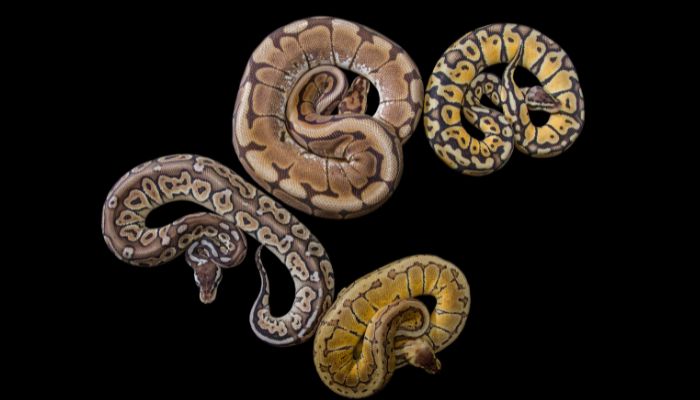
Sources of Calcium for Ball Pythons
Ensuring that your ball python gets its required dose of calcium is not just about supplements; it’s about a holistic approach to their diet.
Natural prey: mice and rats
Nature, in its infinite wisdom, has provided ball pythons with a natural source of calcium: their prey. Mice and rats, with their bones, are packed with the calcium that pythons need.
By feeding them whole prey, you’re ensuring they get a balanced meal, complete with all the essential nutrients.
Calcium supplements: powders, liquids
While natural prey should be the primary source of calcium, supplements can be a helpful addition, especially if you suspect a deficiency.
Available in powders or liquids, these supplements can be sprinkled or mixed with their food. However, it’s essential to consult with a reptile expert or vet to determine the right dosage.
Importance of a varied diet
Just like us, ball pythons thrive on a varied diet. While mice and rats will be their primary food source, occasionally introducing other prey items can ensure they get a mix of nutrients.
A varied diet not only meets their nutritional needs but also keeps them mentally stimulated and engaged.
Calcium plays a pivotal role in the health and well-being of ball pythons. By understanding its importance, recognizing the signs of deficiency, and ensuring a balanced diet, you can ensure your slithery friend leads a healthy, happy life.
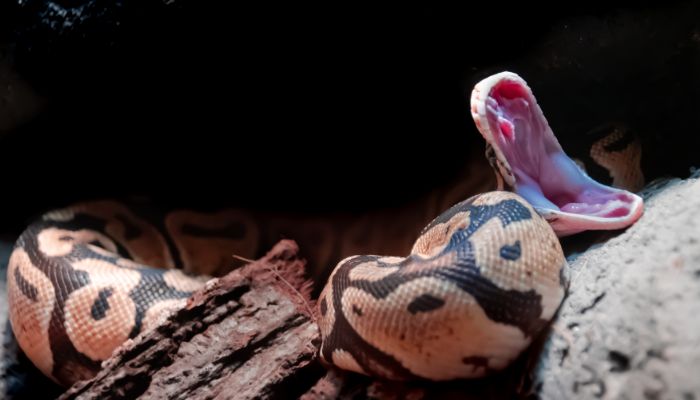
The Danger of Excess Calcium
While calcium is undeniably essential for ball pythons, there’s a saying that goes, “Too much of a good thing can be bad.” This holds true for calcium as well. Over-supplementing can lead to a host of issues that can be as detrimental as a deficiency.
Potential health risks
Excess calcium can lead to health complications such as hypercalcemia, where elevated calcium levels can affect the functioning of the heart, nerves, and muscles.
In severe cases, it can lead to organ damage, particularly the kidneys, as they work overtime to filter out the excess calcium.
Signs of calcium overdose
If your ball python starts exhibiting symptoms like increased thirst, frequent urination, or constipation, it might be ingesting too much calcium.
Additionally, behavioral changes such as lethargy or decreased appetite can also be indicative of an overdose.
Balancing calcium with other nutrients
It’s not just about the amount of calcium; it’s about the balance. Calcium needs to be in harmony with other nutrients, especially phosphorus.
An imbalance can hinder the absorption of both minerals, leading to potential health issues. It’s always a good idea to consult with a reptile nutrition expert to ensure your python’s diet is well-balanced.
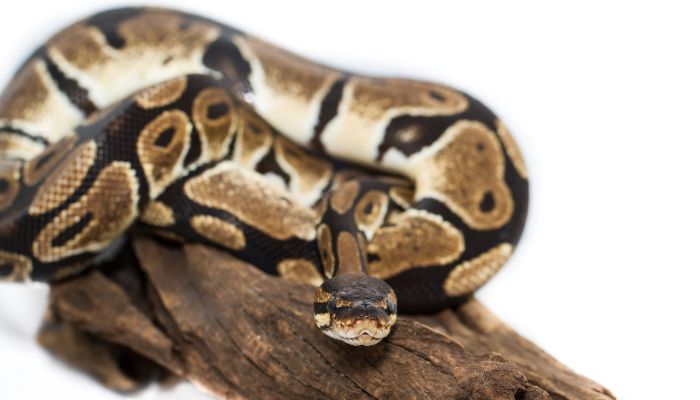
The UVB Connection: Synthesizing Vitamin D3
Sunlight isn’t just for basking; it plays a crucial role in the health of ball pythons, particularly in the synthesis of Vitamin D3, which aids in calcium absorption.
How UVB helps in calcium absorption
UVB rays from the sun help reptiles, including ball pythons, produce Vitamin D3. This vitamin is essential as it aids in the absorption of calcium from the gut, ensuring it reaches the bones and other areas where it’s needed.
The need for UVB lighting in captivity
In the wild, ball pythons get their dose of UVB from natural sunlight. However, in captivity, especially in areas with limited sunlight, UVB lighting becomes essential.
Without it, even if you’re providing enough calcium, your python might not be absorbing it effectively.
Choosing the right UVB bulb
Not all UVB bulbs are created equal. It’s essential to choose a bulb that mimics natural sunlight as closely as possible.
Look for bulbs that offer a broad spectrum of UVB and ensure they’re placed at an appropriate distance from the python’s basking spot. Regularly replace bulbs as their UVB output diminishes over time.
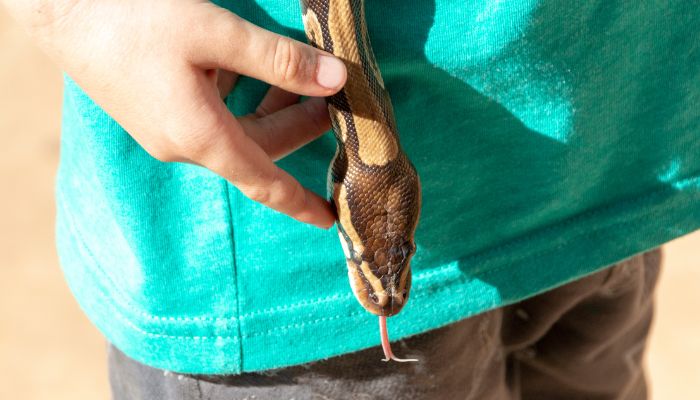
Feeding Practices for Optimal Calcium Intake
Feeding your ball python isn’t just about tossing in a mouse and calling it a day. Oh no, it’s an art, a science, and a dash of love all rolled into one. Ensuring optimal calcium intake requires a bit of knowledge and a sprinkle of dedication.
Let’s break down some best practices to ensure your python gets the calcium it craves.
Gut-loading prey items
Before you introduce that mouse or rat to your python, consider what the rodent has been eating. Gut-loading is the practice of feeding prey items a nutrient-rich diet before they become a meal themselves.
This way, when your ball python dines, it’s not just eating a mouse; it’s consuming a mouse that’s packed with nutrients.
Think of it as turning your prey into a little calcium-packed vitamin pill. By ensuring the prey has feasted on calcium-rich foods, you’re indirectly boosting your python’s calcium intake.
Dusting prey with calcium powder
Sometimes, especially if you suspect a deficiency, you might need to up the calcium game. Enter calcium powders. These are fine powders that can be lightly dusted onto prey items before feeding.
It’s like sprinkling a bit of magic dust, ensuring your python gets an extra boost of calcium. However, remember moderation is key. Overdoing it can lead to the issues of excess calcium we discussed earlier.
Frequency of supplementing with calcium
While it might be tempting to supplement every meal with extra calcium, it’s not always necessary. If your python is on a balanced diet with gut-loaded prey, you might only need to supplement once every few weeks.
However, if there are signs of deficiency or if your python is pregnant or growing, more frequent supplementation might be needed. Always keep an eye on your python’s behavior and consult with a reptile expert to fine-tune the frequency.
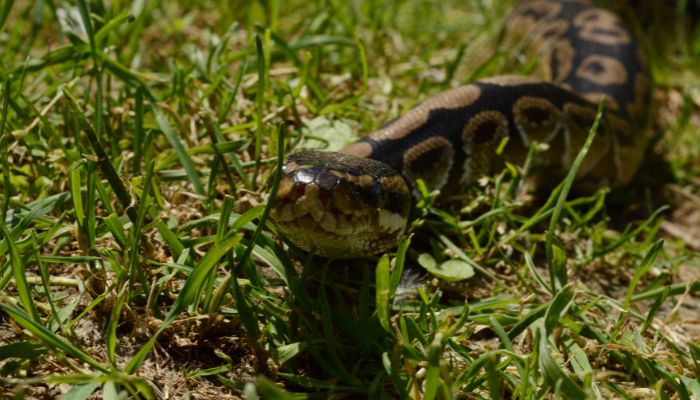
Wrapping It Up
You’ve journeyed through the intricate world of ball python nutrition, uncovering the pivotal role calcium plays in their health.
From understanding its significance in bone strength and muscle function to recognizing the signs of deficiency, you now have a holistic view of this essential mineral.
It’s clear that while nature equips these creatures with mechanisms to derive calcium from their prey, in captivity, a little extra care and attention can go a long way.
Balancing their diet, ensuring they have the right lighting, and being vigilant about their health are all part of responsible reptile care. Remember, too much or too little of anything isn’t ideal, and the same goes for calcium.
As you move forward, use this knowledge as a foundation, always striving to provide the best for your slithery companion.
With the insights you’ve gained, you’re well on your way to ensuring a healthy, happy life for your ball python.
Keep learning, keep observing, and remember: every small effort you make contributes to the well-being of these magnificent creatures. Stay curious and continue to be the best caregiver you can be!
FAQ
Let’s tackle some of the most frequently asked questions to shed light on these slithering wonders.
Do ball pythons need any supplements?
While ball pythons primarily get their calcium from whole prey like mice and rats, there are situations where supplements might be beneficial. For instance, if a python is showing signs of calcium deficiency or if it’s in a growth phase or pregnant, supplements can be a helpful addition. However, always consult with a reptile expert before introducing any supplements.
Can reptiles get too much calcium?
Absolutely! Just like too little calcium can be problematic, an overdose can lead to health issues like hypercalcemia. It’s essential to strike a balance and ensure that your ball python gets just the right amount of calcium, neither too little nor too much.
Is calcium sand good for ball pythons?
While calcium sand might sound like a great way to provide extra calcium, it’s not recommended for ball pythons. They can accidentally ingest the sand, leading to impaction and other digestive issues. It’s always better to provide calcium through dietary means rather than substrates.




0 Comments